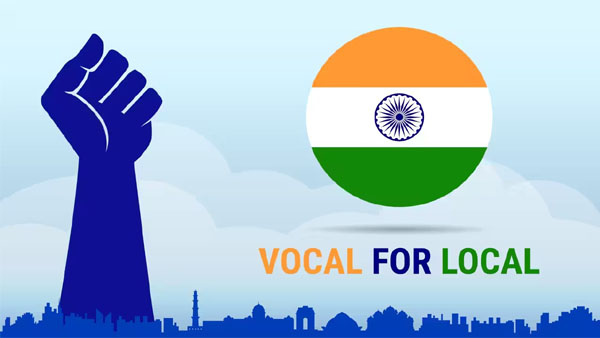By Dipak Kurmi
For the past few months, India has witnessed a renewed surge of enthusiasm toward the philosophy of Swadeshi — a call deeply rooted in the nation’s soul since the days of the freedom struggle. Under the visionary leadership of Prime Minister Narendra Modi, this ancient spirit has been reimagined to suit the aspirations of a modern, self-reliant India. His consistent appeal to citizens to choose Indian-made goods over foreign products is not merely an emotional plea but a strategic and moral movement aimed at reviving the nation’s economic backbone. From “Make in India” and “Make for the World” to “Vocal for Local,” the message has evolved into a powerful national campaign that intertwines patriotism with economic empowerment.
In his recent Mann Ki Baat address and several public interactions, Prime Minister Modi emphasized that adopting Swadeshi is more than a slogan—it is a collective duty. His words have struck a deep chord, especially during the festive months of September to November, a time when the entire nation comes alive with celebrations such as Ganesh Utsav, Navratri, Vijayadashami, Diwali, Chhath Puja, and Eid. This vibrant period, marked by new beginnings, joy, and togetherness, also coincides with October 2 — the birth anniversary of Mahatma Gandhi, who first sowed the seeds of economic self-reliance through his Khadi movement. Recognized as Khadi Day, it stands as a reminder of how self-sufficiency forms the moral and economic spine of Indian civilization.
Prime Minister Modi’s message during these festivities was both simple and profound: let the light of Indian-made lamps, the fragrance of Indian incense, and the craftsmanship of Indian hands illuminate every home. He urged citizens to purchase Swadeshi goods — garments woven in Indian looms, decorations crafted by local artisans, and gifts that carry the essence of Indian soil. “Someone’s money, our goods, but the fragrance of our production will be of my country’s soil, of my Mother India,” he said, capturing the emotional and economic spirit of the movement.
Behind these stirring words lies a deeper economic philosophy. Modi’s call for Swadeshi is an extension of his vision for Atmanirbhar Bharat — a self-reliant India where economic empowerment begins at the grassroots. Historically, Indian society thrived as a network of self-sufficient communities, each contributing through traditional skills and crafts. This framework of self-reliance, once disrupted by colonial economic exploitation and later by the influx of foreign goods, is now being rebuilt. As Mahatma Gandhi wrote in Hind Swaraj, the strength of India lay in her villages, in her artisans, in her self-contained economy where every individual’s labor contributed to the nation’s collective well-being.
During the festive season, India’s streets, markets, and homes become vibrant with products made by its working class — potters, weavers, metalworkers, leather craftsmen, and women artisans from cottage industries. The lamps that light up homes, the khadi fabrics draped in devotion, the clay idols, bamboo decorations, handcrafted toys, sweets, and ornaments — all bear the mark of India’s diverse craftsmanship. Yet, over the decades, as markets became flooded with imported goods, these artisans faced an existential crisis. Their skills, once celebrated, were overshadowed by mass-produced foreign alternatives. The poor man’s Diwali dimmed as foreign-made products replaced local crafts, threatening both culture and livelihood.
However, the tide seems to be turning. The 2025 festive season has marked a remarkable revival of indigenous trade, showing that the spirit of Swadeshi is once again kindling India’s economic fire. According to a survey conducted by the Confederation of All India Traders (CAIT), business activity during Diwali 2025 reached ₹5.40 lakh crore — a sharp rise from ₹4.25 lakh crore in 2024, reflecting a 25 per cent increase. This boom, encompassing nearly 90 million small business units, has largely been attributed to the growing preference for Swadeshi goods. The service sector alone contributed ₹65,000 crore to this surge, while around five million people gained temporary employment during the period. Notably, small towns and rural areas accounted for nearly 28 per cent of total sales, underscoring the growing inclusivity of India’s economic revival.
The statistics tell a compelling story. Around 72 per cent of traders credit this surge to the government’s decision to rationalize GST rates, making indigenous products more competitive. Even more striking, 87 per cent of buyers consciously chose Indian-made goods this festive season, demonstrating that Swadeshi is no longer a nostalgic ideal — it is an economic reality embraced by a new generation of consumers. This resurgence of domestic trade has been further strengthened by government schemes aimed at empowering traditional industries. Programmes such as the Central Government’s Potter Empowerment initiative, coupled with incentives for textile, metalwork, bamboo, and woodcraft sectors under MSME schemes, have significantly boosted rural entrepreneurship and local manufacturing.
The transformation is visible across markets and industries. India’s consumer spending during the festive season is projected to reach an astonishing ₹12–14 lakh crore, according to the latest market analytics report. The Khadi sector, a symbol of India’s self-reliance, has seen unprecedented growth. Since the Prime Minister’s appeal — “Khadi for Nation, Khadi for Fashion” — sales have soared by 447 per cent compared to 2014. The value of Khadi products, which stood at ₹3,154 crore in 2014, is expected to touch ₹1.71 lakh crore by the end of 2025. This exponential growth has not only revitalized traditional weaving but also generated over one million new jobs, reaffirming Khadi’s relevance in the 21st century.
The revival of Khadi and other indigenous crafts is more than an economic milestone; it is a reaffirmation of identity. It connects modern India with its cultural roots while opening pathways for sustainable development. Unlike industrial mass production, traditional Indian crafts operate on eco-friendly principles, utilizing natural materials and promoting minimal waste. This aligns perfectly with the global trend toward ethical and sustainable consumption — an area where India can lead by example.
Prime Minister Modi’s call also resonates deeply with the philosophy of Pandit Deendayal Upadhyaya’s Antyodaya — the rise of the last person. The “Vocal for Local” campaign is, at its heart, about empowering those at the bottom of the economic pyramid: artisans, farmers, Dalits, tribal workers, and women in small-scale industries. When citizens choose Swadeshi products, they are not merely making a purchase — they are contributing to a chain of empowerment that uplifts millions of marginalized families. The festive surge in indigenous trade has translated into higher incomes for rural producers, increased purchasing power for small traders, and greater vitality in local markets. This circular economy strengthens domestic demand and makes India more resilient against global economic shocks.
Moreover, embracing Swadeshi is about nurturing a national consciousness that values the dignity of labor and celebrates the diversity of local craftsmanship. It redefines patriotism in economic terms, making every citizen a stakeholder in the nation’s progress. The “Vocal for Local” movement has transformed from a government initiative into a people’s revolution, proving that self-reliance is not isolation but empowerment through participation.
The story of modern India’s Swadeshi movement is also a story of rediscovery — of reclaiming the economic self-confidence lost over centuries of foreign dependence. As India moves towards becoming the world’s third-largest economy, the foundation of this growth must remain inclusive and rooted in indigenous strength. From the potter’s wheel to the weaver’s loom, from the bamboo crafts of the Northeast to the brasswork of Moradabad, every artisan represents a thread in the vast fabric of India’s economy.
Prime Minister Modi’s message is thus a clarion call to awaken the conscience of a nation: to make every purchase an act of empowerment, every festival a celebration of Indian enterprise, and every citizen a partner in nation-building. The results are already visible — in rising rural incomes, surging Khadi sales, booming local industries, and renewed national pride.
The success of this movement lies not merely in statistics but in the spirit it rekindles. It reminds every Indian that economic self-reliance is not just about manufacturing goods — it is about manufacturing confidence, dignity, and hope. When the lamps of Diwali shine with the light of Swadeshi craftsmanship, they do more than illuminate homes; they illuminate the path toward a self-reliant, united, and prosperous India.
In this new chapter of India’s journey, the essence of Swadeshi stands transformed — not as a relic of the past but as the guiding philosophy of the future. It is both an economic strategy and a moral awakening, a reminder that true freedom lies not only in political independence but in the ability to stand tall on one’s own strength.
(the writer can be reached at dipakkurmiglpltd@gmail.com)




